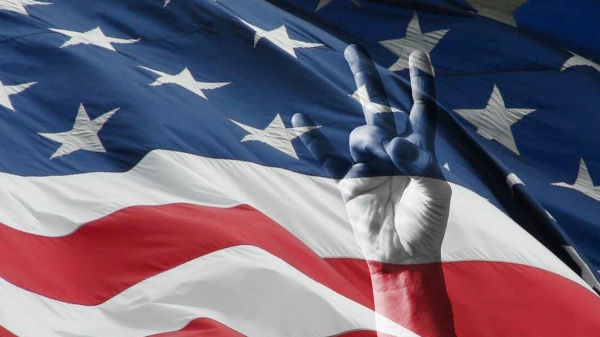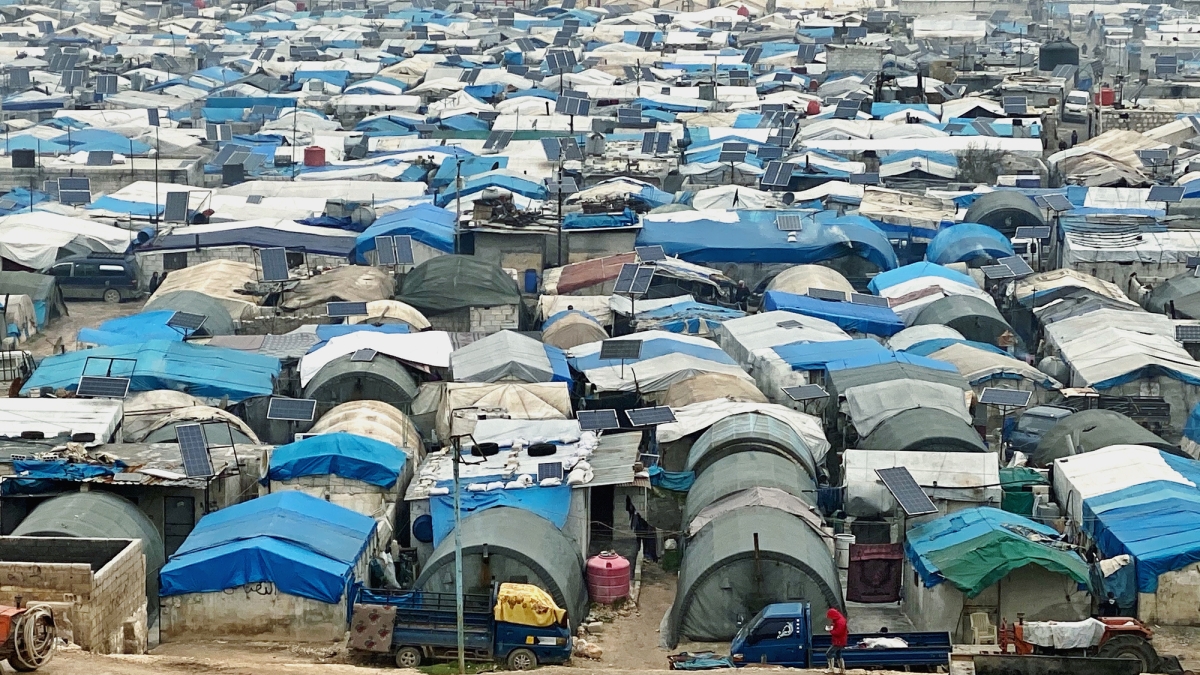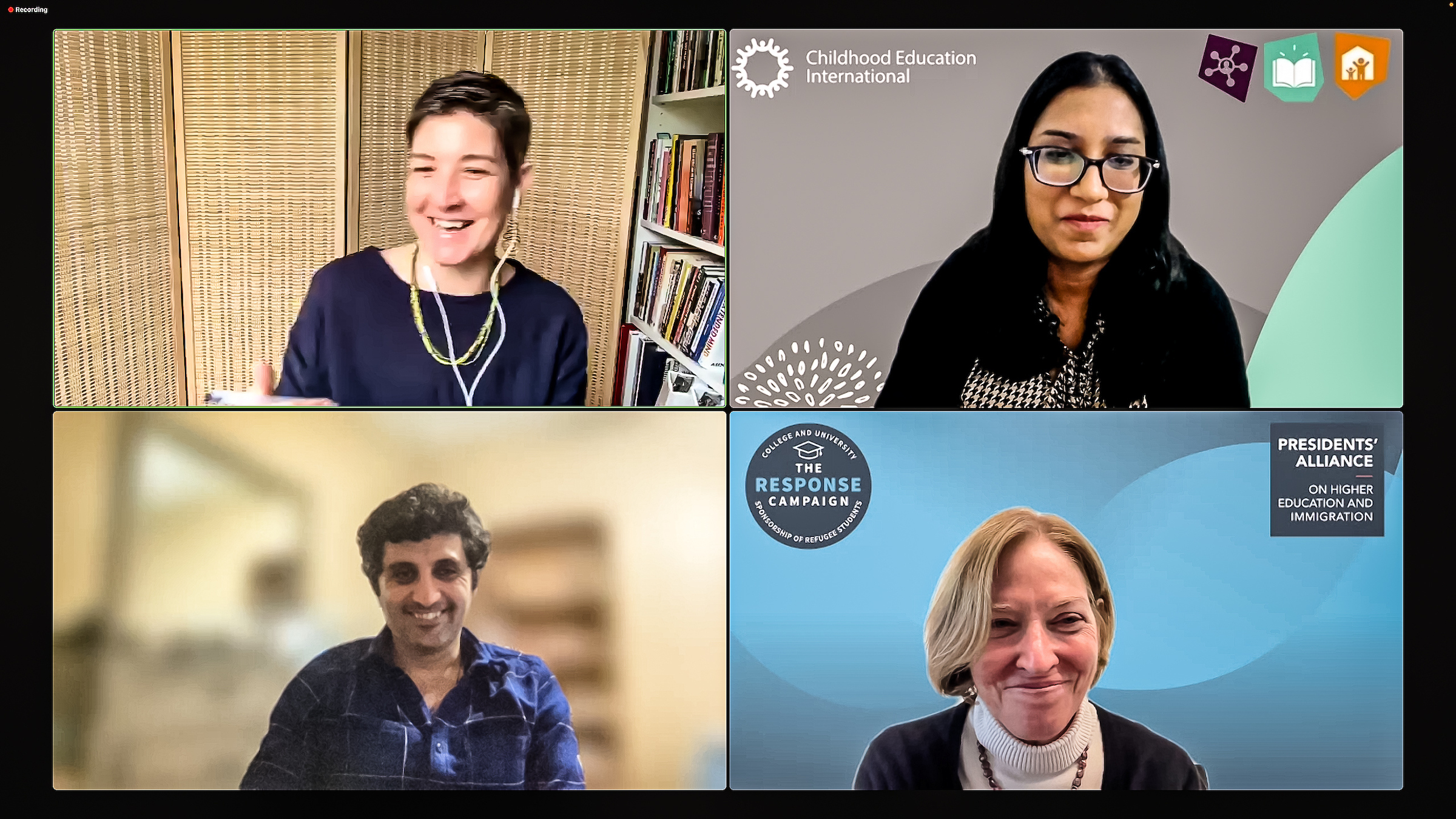Educating refugees is a sprawling, complex mission that requires a difficult level of collaboration, according to several experts who spoke on a panel sponsored by Arizona State University.
“This is urgent,” said Julie Kasper, director of teacher learning and leadership for the Refugee Education Academy at Childhood Education International, who moderated the panel discussion.
“There are lives in the balance, and this has to happen now.”
According to the United Nations Refugee Agency, the number of people who have been forced to flee their homes due to conflicts, violence, fear of persecution and human rights violations was nearly 90 million.
The virtual webinar, titled “Collaboration and Ecosystem Approaches to Refugee Education,” was sponsored by the Office of Global Engagement at ASU's Mary Lou Fulton Teachers College, in partnership with Childhood Education International.
Among the panel experts was Adnan Turan, a PhD student in the teachers college who is Kurdish. He was a refugee with his family, fleeing to Turkey, and later worked with Syrian and Iraqi refugees. He researches how nongovernment organizations, such as nonprofits, affect the assimilation of refugees.
“At many points I found that NGOs abuse this power to use political discourse and political power to change the cultural connections of migrant groups. NGOs follow political power,” he said.
“Migrant or refugee education is more complicated than we thought, from my experience in Turkey. None of the authorities want to take responsibility at this point.”
Turan said there are too many NGOs with differing missions.
“The field is like a dust storm. The roles are not defined,” he said.
A virtual webinar — sponsored by the Office of Global Engagement at Mary Lou Fulton Teachers College and Childhood Education International and the Center for Professional Learning — featured (clockwise from top left) moderator Julie Kasper, director of teacher learning and leadership, Refugee Education Academy, Childhood Education International; Amlata Parsaud, of Childhood Education International; Miriam Feldblum of the Presidents’ Alliance on Higher Education and Immigration; and Adnan Turan, doctoral student in the Mary Lou Fulton Teachers College. Screenshot by Charlie Leight/ASU News
Miriam Feldblum, co-founder and executive director of the nonpartisan, nonprofit Presidents’ Alliance on Higher Education and Immigration, also was on the panel. She researched immigration and citizenship policy and had been a university administrator before launching the alliance.
“As we all know these are not new issues,” she said. “They did not start in the previous administration and won’t be resolved in current moment. But everyone has a role to play, including what the campus leaders are doing.”
Amlata Parsaud, a leadership practice area lead with Childhood Education International, researches collaboration – a complicated concept.
“When I was undertaking my dissertation research, the foremost researchers on collaboration advise you not to do it because it’s so complex and riddled with problems,” she said.
She said the focus should be on building specific collaboration skills.
“Diplomacy, communication — you have to have common goals, a shared vision. Another layer is having trust and relationships,” she said.
“And we’re working in a context where trust has been broken. Collaboration can mask asymmetrical power dynamics.”
Among the points made by the panel:
- There are differences among groups of students that need to be discerned. International students have to promise they will return to their home countries but often see their educational journey as a chance to immigrate. Refugee students potentially have a pathway to resettlement. Different still are undocumented students, who have lived almost their entire lives in the U.S. But these distinctions can be abused to assign more political power to some groups over others.
- Education for refugees can be formal schooling but also non-formal. “Is it a camp situation, introductory classes, early childhood or adult education?” Parsaud said. Pinning it down can be tricky.
- Well-meaning policies can have unintended consequences. Turan said that Turkey opened its public education system to refugees, but required certification from the students’ home countries. “But many refugees have problematic relationships to their home countries. Calling the embassy could be a problem,” he said. Sweden mandated that refugee children should be taught in their home language, but it found an implantation gap when there were not enough teachers who could do it.
- Implementation of policies often falls to teachers, who may not be equipped to carry them out, lacking skills, resources, support or adequate pay.
- Refugees need to be part of the conversation. Feldblum said that the Presidents’ Alliance on Higher Education and Immigration includes refugee student input — and pays them for their work. “It needs to be without unduly burdening them — that emotional labor,” she said. Turan said that it’s difficult to have refugee input at an academic expert level because only 3% of the world’s refugees have access to higher education and few of the degree programs offered are in social sciences.
- Education of young children is extremely difficult immediately after the trauma of fleeing. Turan said he worked with children who had fled Syria. “Their bodies were there, but their minds were across the border, with their families,” he said.
- The pandemic revealed that educational systems across the globe were not prepared and not resilient. And while online education is a viable option, lack of access to the internet and to devices are huge barriers.
Feldblum expects action soon from the Biden administration, which has indicated support for a new category of refugees — P4, for private sponsorship. The action would not require congressional support.
“The president, in the most recent report, actually called out specifically college and university sponsorship of refugee students,” she said.
“This is a game changer. This goes to where a policy change can then enable hundreds, and I hope thousands, of refugee students coming to the U.S. every year to pursue their education and, if they want, have a resettlement pathway.”
The webinar was the first in a series sponsored by Mary Lou Fulton Teachers College. “Belonging for Refugee and Immigrant Students and Families” will be on Oct. 19, and “Social Emotional Learning and Well-being: Cornerstones of Refugee/(Im)migrant Education” will be Nov. 15.
Top image of a refugee camp in Syria by iStock/Getty Images
More Law, journalism and politics

ASU Law to offer its JD part time and online, addressing critical legal shortages and public service
The Sandra Day O’Connor College of Law at Arizona State University, ranked 15th among the nation’s top public law schools, announced today a new part-time and fully online option for its juris doctor…

ASU launches nonpartisan Institute of Politics to inspire future public service leaders
Former Republican presidential nominee and Arizona native Barry Goldwater once wrote, "We have forgotten that a society progresses only to the extent that it produces leaders that are capable of…

Annual John P. Frank Memorial Lecture enters its 26th year
Dahlia Lithwick, an MSNBC analyst and senior legal correspondent at Slate, is the featured speaker at the School of Social Transformation’s 26th annual John P. Frank Memorial Lecture on…



